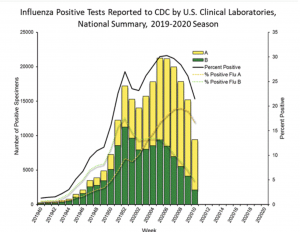
IT’S STILL FLU SEASON TOO!
The flu is here and it does respond to medication!
Influenza (Flu) Symptoms
Influenza (flu) can cause mild to severe illness, and at times can lead to death. Flu is different from a cold. Flu usually comes on suddenly. People who have flu often feel some or all of these symptoms:
- fever* or feeling feverish/chills
- cough
- sore throat
- runny or stuffy nose
- muscle or body aches
- headaches
- fatigue (tiredness)
- some people may have vomiting and diarrhea, though this is more common in children than adults.
*It’s important to note that not everyone with flu will have a fever.
MEDICAL TREATMENT IS AVAILABLE!
You might need antiviral medication to treat flu:
- Antiviral drugs can treat flu illness
- Antiviral drugs are different from antibiotics. Flu antivirals are prescription medicines (pills, liquid, intravenous solution, or an inhaled powder) and are not available over-the-counter
- Antiviral drugs can make illness milder and shorten the time you are sick. They also can prevent serious flu complications, like pneumonia
- It’s very important that antiviral drugs be used early to treat people who are very sick with flu (for example, people who are in the hospital) and people who are sick with flu and have a greater chance of getting serious flu complications, either because of their age or because they have a high risk medical condition. Other people also may be treated with antiviral drugs by their doctor this season. Most otherwise-healthy people who get flu, however, do not need to be treated with antiviral drugs.
- It is VERY IMPORTANT they are started within 48 hours of symptom onset! DO NOT DELAY! However, starting them later can still be helpful, especially if the sick person has a high-risk health condition or is very sick from flu (for example, hospitalized patients). Follow your doctor’s instructions for taking these drugs.
More data about Influenza and why PREVENTION is IMPERATIVE! Influenza https://www.cdc.gov/flu/weekly/
PREVENT THE SPREAD!
Take everyday preventive actions to stop the spread of germs.
- Try to avoid close contact with sick people.
- While sick, limit contact with others as much as possible to keep from infecting them.
- If you are sick with flu-like illness, CDC recommends that you stay home for at least 24 hours after your fever is gone except to get medical care or for other necessities. (Your fever should be gone for 24 hours without the use of a fever-reducing medicine.)
- Cover your nose and mouth with a tissue when you cough or sneeze. After using a tissue, throw it in the trash and wash your hands.
- Wash your hands often with soap and water. If soap and water are not available, use an alcohol-based hand rub.
- Avoid touching your eyes, nose and mouth. Germs spread this way.
- Clean and disinfect surfaces and objects that may be contaminated with germs like flu.
We are learning a LOT about community health by watching the rapid global sweep of the Coronavirus. Yet, for many years the Influenza has killed close to a half million people every year, year after year. Why were we less concerned then from a public health standpoint? That is the million dollar question.
NOW WE KNOW!
When we know better – we do better. Let’s keep learning and doing our 100% best to prevent more illness.
IF YOU HAVE BEEN COVID-19 TESTED….
Covid-19 Live Updates – https://ncov2019.live/
Flu Information – https://www.cdc.gov/flu/
Dr. Nancy Sutton Pierce
Director of Public Relations HTMC
We use SKYPE for your Telemedicine visits – DOWNLOAD in advance!
Search Skype for live:hilltopmedicalclinic